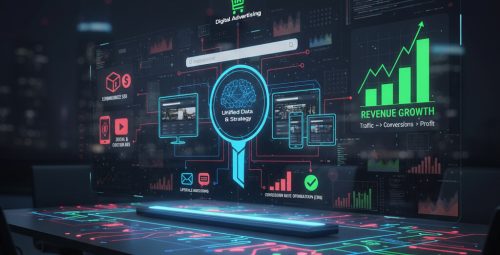Facebook (now part of Meta) remains one of the most powerful social media advertising platforms. With more than three billion monthly active users, Facebook and Instagram offer businesses access to huge audiences across the customer journey. However, rising costs per click (CPC) and algorithmic changes have made it harder to stand out. Many brands therefore partner with a Facebook Ads agency (sometimes called a Meta Ads agency, FB ads agency or Facebook advertising company) to plan, launch and optimize campaigns.
This article explains what a Facebook Ads agency does, why choosing the right partner matters today and how to evaluate agencies based on expertise, transparency and results. We’ll cover core components of Facebook advertising, best practices for agency selection, tools to expect, common pitfalls and a real‑world case study. By the end, you’ll know how to find a results‑driven agency that can grow your business and deliver a strong return on investment (ROI).
What Is a Facebook Ads Agency?
A Facebook Ads agency is a marketing firm that specializes in planning, managing and optimizing paid campaigns across Meta’s social media platforms (including Facebook, Instagram, Messenger, Threads and Audience Network).
Top agencies often provide a full suite of Facebook advertising services, from audience research and copywriting to bid management and conversion tracking set up. Some also offer full service digital marketing solutions that integrate search, display, CRO and SEO with social media advertising to help drive powerful cross platform results. The goal is to help businesses reach the right audiences with the right message at the right time to drive conversions.
A Facebook Ads agency operates as a focused specialist supporting your broader digital marketing efforts. It complements organic content, email marketing and PPC platforms like Google Ads. Because Meta campaigns primarily target users based on demographics, behaviors and interests rather than specific search queries, they’re ideal for mid‑funnel awareness and retargeting.
A skilled agency will design campaigns that align with your overall marketing objectives and fit seamlessly with other social media platforms and integrated marketing efforts.
Why It Matters Today
A Massive, Growing Advertising Channel
Facebook’s advertising revenues continue to grow. Industry reports estimate that Meta’s worldwide ad revenue will reach over $116 billion in 2025 (blog.hootsuite.com), making it the largest social‑media advertising platform by revenue. Businesses of all sizes use Facebook and Instagram ads to build brand awareness and drive sales.
Rising Competition and Costs
More advertisers are entering Meta’s auctions, pushing up costs per click (CPC) and cost per mille (CPM). With limited screen real estate, achieving strong conversion rates and ROAS requires precise targeting, continuous optimization and relentless testing. A competent agency can help set up tracking, manage bidding strategies and design creative testing to maximize performance.
Privacy, AI and Changing Algorithms
Privacy regulations and Apple’s App Tracking Transparency have reduced the amount of data available for targeting. Meanwhile, Meta’s AI‑powered tools automate bidding and targeting decisions. Navigating these shifts demands strategic expertise and a strong first‑party data foundation. The best agencies will leverage in-depth tracking, Conversions API and stay up to date with Meta platform updates to keep your dollars working harder.
How It Works / Core Components
Successful Facebook advertising hinges on several key elements. When evaluating agencies, ensure they have processes and expertise across the following areas:
1. Strategy & Audience Research
- Business Goals: The agency should start by understanding your objectives, brand awareness, lead generation or direct sales, and recommend campaign types accordingly.
- Audience Definition: They will build customer personas based on demographics, interests, behaviors and lookalike modeling to reach high‑intent users.
- Competitive Analysis: Agencies assess competitor ads and market benchmarks to position your brand effectively and keep pushing performance.
2. Campaign Setup & Structure
- Ad Account Organization: Proper naming conventions and campaign structure (e.g., separate campaigns by objective or funnel stage) improve reporting clarity and optimizations.
- Budget Allocation: Agencies allocate budgets across campaigns and ad sets, testing different audience segments and placements with a strong pulse on performance.
- Creative & Copy: They develop timely, on-brand ad copy, images and videos tailored to audiences and placement, following Facebook’s ad policies.
3. Tracking & Reporting
- Pixel & Conversions API: Agencies install and configure the Facebook Pixel tracking to measure conversions accurately, even with privacy changes (by using server-side tracking).
- Performance Dashboards: They deliver regular reports on spend, impressions, reach, clicks, return on ad spend (ROAS) and cost per conversion, with insights and recommendations.
- Testing Framework: They run A/B tests on creative, know how to use UTM tracking, bidding and targeting to optimize ad campaigns continuously.
Best Practices and Strategies
When selecting a Facebook Ads agency, look for the following attributes and strategies:
1. Focus on Business Objectives and KPIs
The agency should translate your high‑level goals into measurable metrics, such as qualified leads, revenue or ROAS. Avoid agencies that only report vanity metrics without linking to business outcomes or sharing insights into ad performance.
2. Transparent Communication and Pricing
Choose a partner that explains campaign strategy clearly and shares performance data openly. Ask about their fee structure, flat retainer, percentage of ad spend or hybrid, and ensure there are no hidden costs.
3. Proven Results and Case Studies
Look for results‑driven agencies that share ad campaigns and conversion rate improvements. Review case studies and ask for references. One example is Arlo Technologies, where our integrated PR , influencer and digital marketing strategy delivered 192 thousand engagements and a 247% revenue lift over a short 48-hour window for Prime Day. Such data points demonstrate an agency’s ability to generate measurable growth and showcase collaboration.
4. Audience Expertise and Creative Capabilities
Facebook’s strength lies in its audience targeting and creative. Ensure the agency can build, test and refine custom audiences, lookalikes and interest segments. They should also design top-notch, engaging creative that aligns with your brand voice and campaign objectives.
5. Data‑Driven Optimization and ROAS Focus
A high‑performing agency uses data to make decisions. They should regularly analyze campaigns, adjust bids, reallocate budget, refresh creative and update audience segments to maximize your return on investment.
6. Integration with Other Channels
A great agency understands how Facebook advertising fits into your overall marketing mix. They can coordinate campaigns with email marketing, PR, SEO or Google Ads to create a seamless customer journey. Explore our Digital Strategy Services for examples of integrated marketing.
Tools & Resources
A professional Facebook Ads agency will utilize various tools to plan, execute and analyze campaigns:
- Meta Ads Manager: The core platform for creating and managing campaigns.
- Facebook Pixel & Conversions API: Tracks website actions and sends first‑party data to Meta for measurement and optimization.
- Creative Tools: Design software (Adobe CC) and video editors (Final Cut Pro, Adobe Premiere) for ad assets.
- Google Analytics 4 (GA4) & Looker Studio: Provides cross‑channel analytics and dashboards to evaluate performance beyond the Facebook ecosystem.
- CRM & Marketing Automation: Sync leads and conversions to your CRM for segmentation and lifetime value analysis.
Common Mistakes to Avoid
- Choosing the Lowest‑Cost Agency: Bargain agencies often cut corners. Focus on value and ROI rather than hourly rates.
- Over Promising Immediate Results: Facebook algorithms need time to learn. A good agency sets realistic expectations and explains the learning phase.
- Ignoring Creative Fatigue: Ad creatives can saturate quickly. Agencies should refresh visuals and copy regularly.
- Lack of Data Ownership: Ensure you retain ownership of your ad account and data. Avoid agencies that run campaigns under their own accounts.
- Not Aligning with Brand Guidelines: Ads must reflect your brand’s tone and visual identity. Choose an agency that listens and adapts to your voice.
Case Study / Real‑World Example
During Amazon Prime Day, home security brand Arlo partnered with The Brand Amp to increase visibility and drive sales for its hero product deals. The campaign combined paid digital and influencer marketing to create a cohesive, full-funnel strategy centered on measurable performance.
By optimizing creative and audience targeting across Meta and other paid platforms – and aligning influencer content with high-intent shoppers on Amazon – the team achieved standout results. The integrated campaign delivered a 247% revenue lift, 3.4 million impressions, 192,000 engagements, and a 6.35% average CTR, all while maintaining CPC and CPM rates 60% better than benchmarks.
This collaboration proved that a results-driven, performance marketing approach, anchored by cross-channel ad optimization and data-backed creative, can dramatically improve efficiency and ROI, even in highly competitive e-commerce environments. Read the full case study.
Conclusion & Key Takeaways
Finding the right Facebook Ads agency can accelerate your business growth and maximize your advertising investment. As you evaluate partners, prioritize those with a strategic approach, transparent reporting, creative expertise and proven results. Ensure they align campaigns with your business objectives and integrate Facebook advertising within a broader digital strategy. Avoid agencies that promise quick fixes or lack data‑driven insights.
Ready to amplify your social media advertising? The Brand Amp’s paid social marketing team specializes in driving measurable ROI through Facebook, Instagram and other social media advertising channels.
Contact us to discuss how we can tailor a performance marketing strategy for your brand!
Frequently Asked Questions
1. How does a Facebook Ads agency charge for its services?
Agencies may charge a flat monthly retainer, a percentage of ad spend or a hybrid approach. Make sure the pricing model aligns with your budget and incentives.
2. How long does it take to see results from Facebook ads?
Results depend on your industry, budget and objectives. Most campaigns enter a learning phase for one to two weeks (depending on conversion data). A robust testing and optimization process typically shows meaningful improvements within the first one to three months.
3. Can a small business benefit from a Facebook Ads agency?
Absolutely. Small businesses with clear goals and defined audiences can gain visibility and sales by targeting specific demographics and interests. A professional agency helps you avoid costly mistakes and maximize your budget effectively.
4. What’s the difference between a Facebook Ads agency and a full‑service digital agency?
A Facebook Ads agency focuses primarily on Meta advertising. A full‑service digital agency offers a broader range of services, including SEO, PPC across multiple platforms, web design, content creation and social media management. The Brand Amp provides both specialist and integrated marketing solutions.
5. How should I measure the success of my Facebook advertising?
Use metrics like ROAS, cost per acquisition (CPA), conversion rate and customer lifetime value. Make sure your agency sets up proper tracking with Facebook Pixel, Conversions API and GA4 so that you can attribute revenue accurately.
6. How can I verify an agency’s credibility?
Review case studies, testimonials and third‑party reviews. Ask for references and examples of campaigns they’ve managed. Look for certifications such as Meta Business Partner status and confirm they stay current with platform updates.






